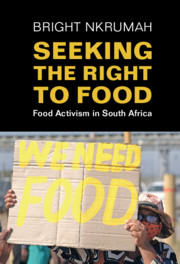Seeking the Right to Food is a discourse on the subject of food insecurity, and how to bridge the gap between strong policies and weak practice. It serves as a window into the daily struggles and social injustice perpetuated against humans who inhabit a geographical enclave christened South Africa. A reader might wonder why an entitlement debate, particularly in post-apartheid South Africa, deserves further consideration. In responding to the question simply and without equivocation, three contradictions inspired the planning and writing of the book. First, while the right to food is entrenched in South Africa’s Constitution, there is no specific statute or department to give effect to this right. Second, while human rights activists have, on numerous occasions, approached the Constitutional Court to enforce socioeconomic rights (water, housing and health), food security–related NGOs have taken a back seat in this arena. Third, while hundreds of South Africans often take to the streets in demand for service delivery, this form of mobilisation has rarely been channelled to improved access to food. Why is this the case and how can this trend be reversed?
In seeking to understand the limited contestation around food insecurity, I drew from the work of social theorists in developing my central argument: in a regime where there is bureaucratic inertia to the politics of provision, collective action could serve as a legitimate means of triggering reform. Yet, in order to do so, present-day citizens, as their ancestors before them, need to be conscientised of their rights and freedoms, and their capabilities to use mobilisation as a tool kit for transforming existing institutions to improve their conditions. This form of sensitisation is key as a disproportionate percentage of citizens are oblivious of their entitlements as rights holders and that the state has an obligation as a duty bearer to fulfil this entitlement.
As a counter-discourse, Seeking the Right to Food builds a compelling argument that the right to food paradigm is increasingly being eclipsed by other rights, as scholars and policymakers shift their attention towards the growth of dominant civil/political and social/economic rights. The book provides a more direct answer by arguing for a rehabilitation of the notion ‘right to food’ as quintessential to human development and welfare. In constructing an alternative epistemology of increasing commitment to food security, the book locates prevalent hunger in the human rights–based approach, and emphasise that the right to food and other rights (broadly construed) are inextricably linked, and not mutually exclusive imperatives. To improve the lot of needy men, women and children, it is important to both safeguard their assess to sufficient food and advance their general human rights.
Drawing from (inter)national norms, as well as real-life historical and contemporary contexts, the book argues that freedom from hunger, like other liberties, can only be achieved through coercive authority of political and social institutions to respond to the needs of the impoverished. Above all, it assesses more affirmative, coercive and legitimate approaches of transforming policies into practice, as well as modern-day activists’ approaches to be adopted by supposedly (quasi)judicial institutions to give teeth to the right to food. By advocating for food activism, the book ultimately departs from conventional approaches that citizens, scholars and human rights practitioners will ordinarily envisage. Besides advocating for litigation and moral appeals as a means of improving the lot of the poor, it makes forays into the annals of legal-social thoughts, engaging with all the relevant conceptual discourses, and drawing lessons from different settings, including the US, Canada, France, Haiti, United Arab Emirates, Saudi Arabia, Syria, Bahrain, Jordan, Egypt, Germany, Britain, Spain and Senegal. By drawing from these countries, it situates the food security within the framework of accountability and actual disputes, giving rise to possibilities of redress such as adjustment of legislations, norms and practices. To this end, even though the book was inspired by daily struggles and deprivations in South Africa, it serves as an apt theoretical framework and a blueprint for present and future generations in South Africa and elsewhere to collectively transform economic systems, which deepen inequality. Considering that hunger is a global phenomenon, I hope this contribution will be of use to economists, policymakers and human rights advocates as they seek to advance social justice and human dignity in the Global North and South.

